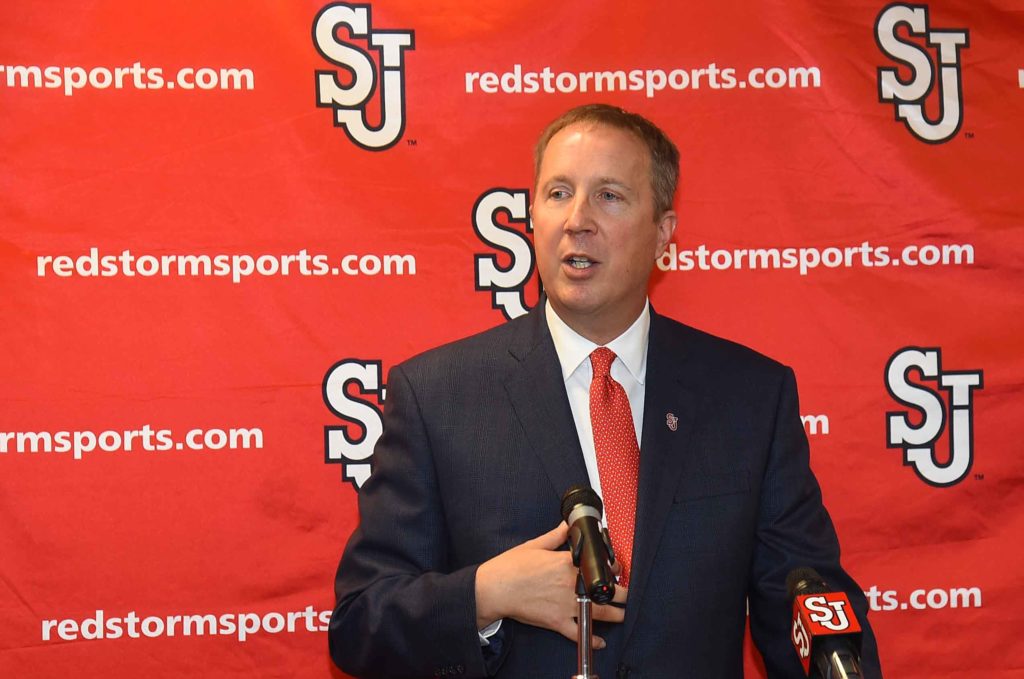 “After the cancellations by the NCAA, we quickly gathered our coaches and administrators and started the process of getting kids home, feeling that their safest place was to be at home.” – Mike Cragg, AD, St. John’s University
“After the cancellations by the NCAA, we quickly gathered our coaches and administrators and started the process of getting kids home, feeling that their safest place was to be at home.” – Mike Cragg, AD, St. John’s University
St. John’s University announced Thursday that it has suspended all activities indefinitely amid the coronavirus outbreak. St. John’s is located in the heart of New York City, the state itself has over 400 cases of COVOD-19, with NYC seeing the highest incidents.
“Our university has been fantastic about putting our student’s health and safety first and our department feels the same way.”
The university is working to get students and student-athletes home and is transitioning to virtual learning and Cragg says his student-athletes will still be putting in the work.
“Our reminder to our student-athletes is that this is not a vacation. They are expected to keep with classes and we adjust to this new normal, across the country.”
AD Mike Cragg tells CollegeAD, the decision to suspend athletics wasn’t taken lightly and was announced with guidance from public health and medical professionals and the university’s leadership.
“For the ADs and presidents, we’ve been on calls, assessing the situation since last Sunday. The whole staff has spent that time gathering information and having experts in the room with us. We had good leadership throughout and daily calls.”
The St. John’s men’s basketball team faced off against No. 1 Creighton in an almost-empty Madison Square Garden during a Big East Tournament showdown earlier Thursday, only to have the game canceled during halftime.
“That whole situation changed rapidly. We had a call talking about the city was going to proceed with the tournament. We felt there was no need for a discussion as we were ahead of New York City protocols, but obviously that situation changed quickly.”
He added, “there’s been some criticism that we were on the court, but truly it was just a matter of escalating and cascading effect. I was confident in the decision and we all hoped to move forward, but as things changed, I was confident at halftime that it was very clear that it was time to end that.”
At almost unimaginable speed, other conferences around the NCAA also canceled their postseason tournaments, and the NCAA canceled its men’s and women’s college basketball tournaments as the fallout from the spread of coronavirus continues.
“For us being in New York, we had a short ride to get back to campus to start going through the planning around 3 pm on what we thought was the canceling of spring sports, by the time we got to that 4 pm meeting it had changed to being canceled across the country.”
Since St. John’s is located in Jamaica, NYC, Cragg tells CollegeAD, on a university level they had been watching news of the COVID-19 virus since January.
“For our campus, it started with the president and his leadership and athletics was part of that as a crisis management group, that’s been going on for weeks. There’s a lot of experience here having gone through 9/11, Supercell Sandy, all of those types of situations. This is a well-trained university as far as ‘expect the unexpected.’”
While St. John’s does have a large commuter student population, they do have 3000 students that live on campus.
“We have a great responsibility towards them and our international community as well. It’s challenging but we had great confidence in our leadership here on campus.”
Cragg says the dorms are still open and while there are very few students still in the dorms, there are a handful of student-athletes.
“Right now, it’s mainly just international student-athletes or student-athletes with extenuating circumstances. But there is still food being prepared, I won’t say it’s normal but the campus is still open and still having its own life, albeit a limited capacity. The care is still there.”
Cragg says he sent a note to the student-athletes thanking them for all they’ve done on campus and acknowledging the pain that the canceled sporting events can cause for many student-athletes.
“I think the helpful part for them is that all of their peers and competitors are going through the same thing, we are not isolated in that regard. When we got word that the NCAA was considering longer eligibility, we sent it out right away, for them it’s acknowledging that there is still some hope.”
